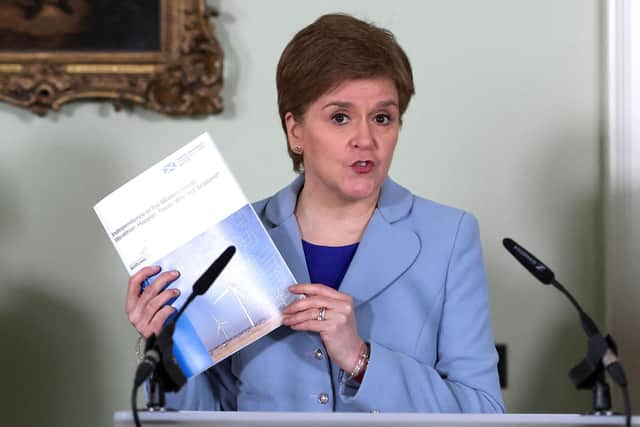Nicola Sturgeon sets scene for a poorer, more miserable and divided Scotland - Brian Monteith
In as strange if not absurd a political paper as I have seen for a long time, it fais to rise to the challenge of answering the key questions that resulted in a convincing defeat for the Scotland leaving the United Kingdom, held on a high turnout referendum of 84.6 per cent.
I have read better and far more honest papers from nationalists like Jim Sillars or Robin McAlpine who have the sense to face up to the serious issues a Scotland divorced from the United Kingdom would face and at least propose rational approaches.
Advertisement
Hide AdAdvertisement
Hide AdA better title for it would have been “Poorer, Miserable and Divided: What’s to like Scotland?” and I’ll explain why.


True, there are more papers to come from the Scottish Government, but as the starter paper it simply did not satisfy, being like a mutton pie without the meat in it.
Whoever had the idea of comparing the UK to a range of countries that Scotland might emulate clearly is too-clever-by-half. Comparing the United Kingdom to Iceland? Really? I am a great advocate for Iceland but considering a country of 70 million multicultural people with a homogenous population smaller than the 416,000 living in Tayside is simply daft.
The paper listed other small comparator countries, no doubt to show small could mean successful, including Austria, Belgium, Denmark, Finland, Iceland, Ireland, the Netherlands, Norway, Sweden and Switzerland – but all this did was raise more questions. The elephant in the room is obvious – why is the statistical data for Scotland not provided to make a comparison of the current position?
Not far behind is the question why stop at those countries? Why not include others such as Portugal and Greece? Both are around 10m people just like Sweden. Or why not Czechia (10.7m) and Slovakia (5.4m) who at least actually split from being Czechoslovakia? Maybe because their examples were not helpful?
Then there’s the issues that are compared – why not look at the number of drug deaths? Those are areas that Scotland compares very badly against many countries of a similar size and must surely seek to improve upon. Could it be such comparisons would show the SNP government in a very poor light – and given they have the necessary levers at their disposal, undermine the case for “more powers”?
None of my observations of the paper are meant to suggest Scotland could not behave like any of the independent nations the UK is compared with, clearly countries come in all sizes. It is to say, however, that they have corresponding policies – such as high public spending being supported by high taxation. Given Scotland enjoys greater public spending per capita than England, to continue with that level of financial support – or, as the paper implies, increase it – would require taxation to be raised considerably just to stand still, and to eye-watering levels to spend more. Maybe then Scotland could be like Ireland and charge 60 euro for a GP consultation or have charges for sick notes, vaccinations, ECGs and blood tests?
Comparisons can always look attractive if you leave out the small print and pretend there is never a catch.
Advertisement
Hide AdAdvertisement
Hide AdThen there is the nonsense of including Ireland’s GDP when it is common knowledge that this is wildly inflated by the practice of multinational corporations routing their turnover for the whole of the EU through the Republic for tax advantages. Yes, the report placed a note stating there was contention around Irish GDP figures but then went on to state it was still justifiable to use the data. For Scotland (or indeed the UK) to emulate Ireland’s “economic miracle” would require not just a corporation tax of 12.5 per cent but the ability to enter into various tax treatments peculiar to Ireland (such as through civil aircraft leasing) that reduce the tax take to around four per cent. Rather than other countries emulating this approach it is more likely it will in time be outlawed as a means of writing off tax revenues due properly to other neighbouring countries.
Another example of the sleight-of-hand is the mention on life expectancy, which argues all the comparator countries have higher life expectancy at birth than the UK – but this is misleading – the UK average (81 years in 2022) is pulled down by Scotland’s lower figure of 79 years and were Scotland’s figure to be used it would prove embarrassing but England’s figure would then be ahead of Belgium and the Netherlands.
Nicola Sturgeon’s paper has too many gaps, too many holes and too little grasp on what secession would mean for Scotland. It does not resolve how Scotland could tax itself to be wealthier when it would need higher taxes just to meet current spending. It does not demonstrate how “independence” would bring any happiness to drug addicts or improve life expectancy or solve all the social ills that she already has powers to deal with – and additional funding to spend on it.
Scotland would undoubtedly be poorer at the outset and left fighting over a plan. It would be more miserable as a result and the bitterness and division in the country in reaching that landing point would be devastating – leading to the flight of capital and talented people. There’s nothing to like in any of that.
Brian Monteith is a former member of the Scottish and European Parliaments and is editor of ThinkScotland.org
Comments
Want to join the conversation? Please or to comment on this article.